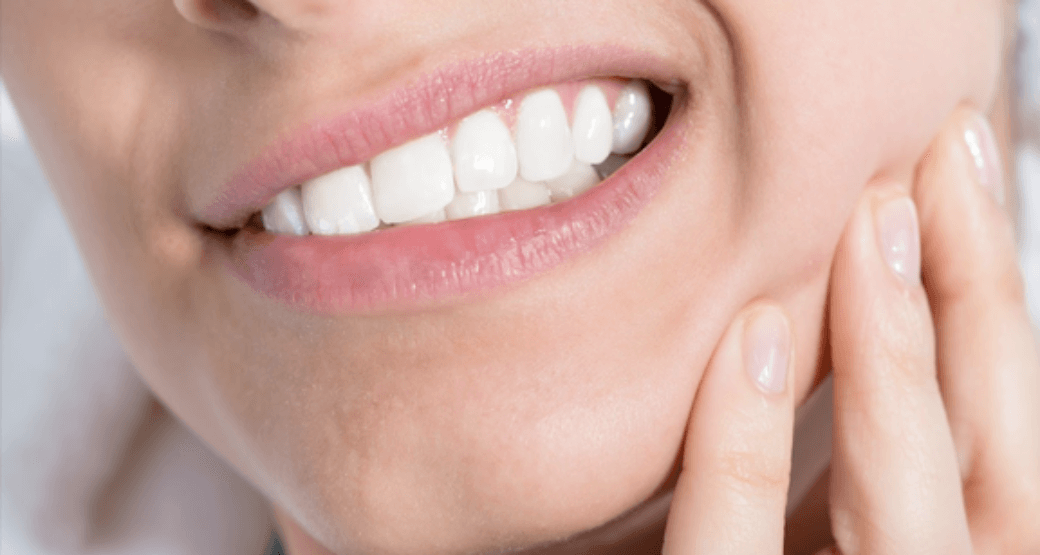Bruxism is an extremely common condition characterized by grinding or clenching your teeth — which can be damaging to your dental and facial structures. Luckily, there are simple treatments and self-care routines that you can adopt in order to slow or stop the grind.aa
In this post, we will discuss:
- What is Bruxism?
- What are the Symptoms of Bruxism?
- What are the Causes of Bruxism?
- Are There Any Long Effects?
And how Bruxism can easily be treated.
What is Bruxism?
Bruxism is a condition in which someone grinds their teeth forcefully, either side to side or front to back.

Bruxism can happen whether you are asleep or awake (although sleep Bruxism is more common). If you have sleep Bruxism, you may be unaware until the consequences become more prevalent. Usually, those with sleep Bruxism have other sleep disorders (sleep apnea, snoring).
Awake Bruxism is seen as more of a bad habit. Just like biting your nails or twiddling your thumbs, it can be a coping mechanism for fear or anxiety.
Symptoms
If you are suffering from Bruxism, you may show these signs:
- Teeth grinding loud enough to wake a sleep partner
- Flattened or broken teeth
- Worn tooth enamel, exposing layers of your tooth
- Increased tooth sensitivity
- Facial or jaw pain
- Tired jaw muscles/locked jaw
- Earache-like pain
- Dull headaches at the temples
- Sleep disruption
- Damage to the inside of your cheek
Contact your healthcare provider if any of these symptoms occur or worsen.
Causes
According to the National Sleep Foundation, the exact causes of Bruxism are unknown, but it has been linked to factors such as anxiety, stress, alcohol consumption, cigarette smoking, caffeine, sleep apnea, snoring, and fatigue.

Bruxism may also be related to an abnormal bite, an aggressive personality, medications, genetics, and mental disorders such as Parkinson’s disease, dementia, gastroesophageal reflux disorder (GERD), and epilepsy.
Although many adults suffer from Bruxism, it is most common in children. This may be in response to teething pain or due to hyperactivity. Many children tend to not carry bruxism with them into adulthood.
Effects
Bruxism definitely leaves its mark on those who have it — if left untreated for a long period of time.
Over time, your teeth may become flattened or square-shaped. This is because frequent grinding can actually wear them down and create a shorter appearance. Bruxism can also damage dental restorations such as crowns or fillings.
When your teeth wear down, the enamel layer diminishes with them. Enamel is irreplaceable and acts as a protective layer to your teeth — warding off bacteria. It also helps to prevent hot or cold temperatures from reaching the root of your tooth, which can be quite irritable. Because of this, you may have a sensitivity to certain foods and drinks.
Gum damage has also been linked to Bruxism. Grinding your teeth loosens the connective tissue that holds your teeth in place. Ultimately, this can loosen your teeth and result in inflamed gums.
Bruxism can also lead to TMJ (Temporomandibular joint) problems due to the constant jaw-grinding motion.
How is Bruxism Treated?
Mouthguards and Splints
A simple fix to Bruxism is to wear a mouth guard or splint at night (if you have sleep Bruxism).
Wearing one will even out the pressure across your jaw and block the upper and lower teeth from grinding — preventing further harm.
If you’ve ever had braces, you are probably familiar with mouth guards — whether you played sports or not. Mouth guards for Bruxism are very similar. You can purchase a mouth guard from a pharmacy or order a custom-made one from your dentist for a better fit.

Mouth splints are similar to guards, but they are made from a harder plastic and fit perfectly over your teeth. Both are effective, but splints last for years while guards may only work for months.

Self-Care
It is possible for Bruxism to be slowed and eventually, stopped with a few habit-breaking tips.
First, practice good sleep hygiene — follow this set of instructions that aims to correct personal habits and environmental factors that interfere with sleep:
- Avoid consumption of coffee, tea, stimulants, chocolate, and medications containing caffeine
- Avoid drinking alcohol at least six hours before bedtime
- Avoid smoking for at least six hours before bedtime
- Avoid eating heavy meals before bedtime
Oftentimes, Bruxism is related to stress and anxiety. Try these activities in order to relax your mind and body:
- Deep breathing exercises
- Massage
- Reading
- Having a bath
- Listening to music
- Yoga

There are also muscle relaxation techniques you can pick up that prevent Bruxism. These are specific methods that release tension between the jaw and lip muscles — You must repeatedly clench and unclench your teeth for five seconds each at least five times a day.
For more exercise instructions visit Explore Integrative Medicine.
Therapy
Thirty-one percent of those who have Bruxism are adults. A recent study looked into the effects of therapy on adult Bruxism trying to answer “What is the best treatment for adults with Bruxism? They found that therapy can be quite helpful alongside medical treatment. Therapy may reduce the underlying stressors causing you to grind your teeth.
If you are experiencing any of the symptoms of Bruxism, it is a good idea to pay your dentist a visit — you may need a mouth guard or splint. At the same time, It is also helpful to be proactive in treating your condition through relaxation and sleep therapy. Use this information to stop your grinding habits and ensure the future of your smile.

